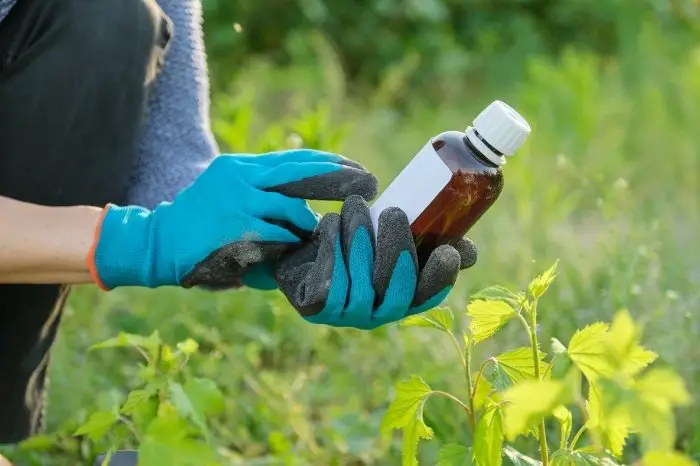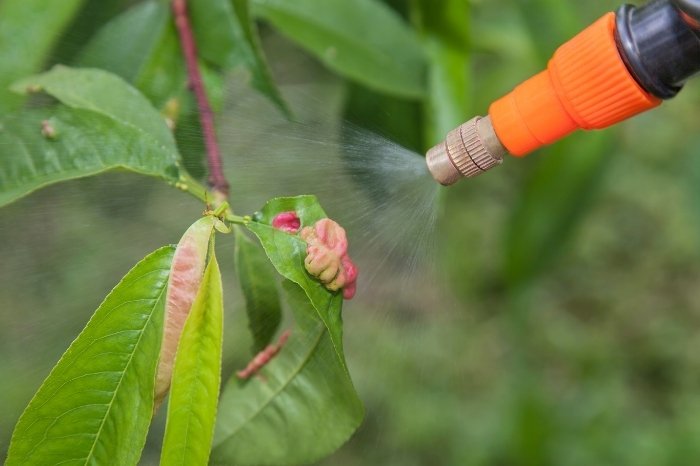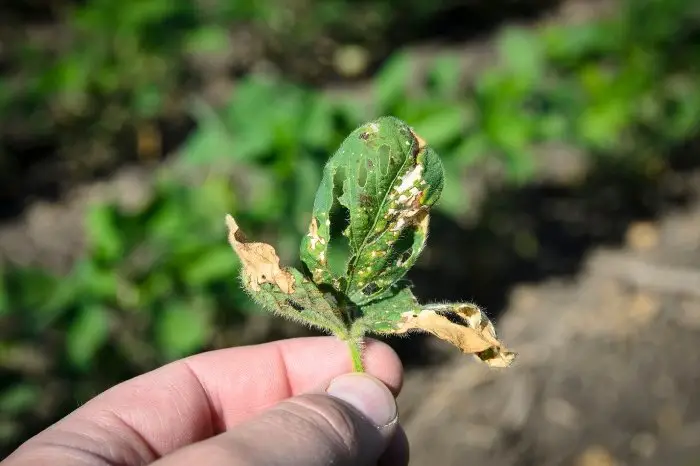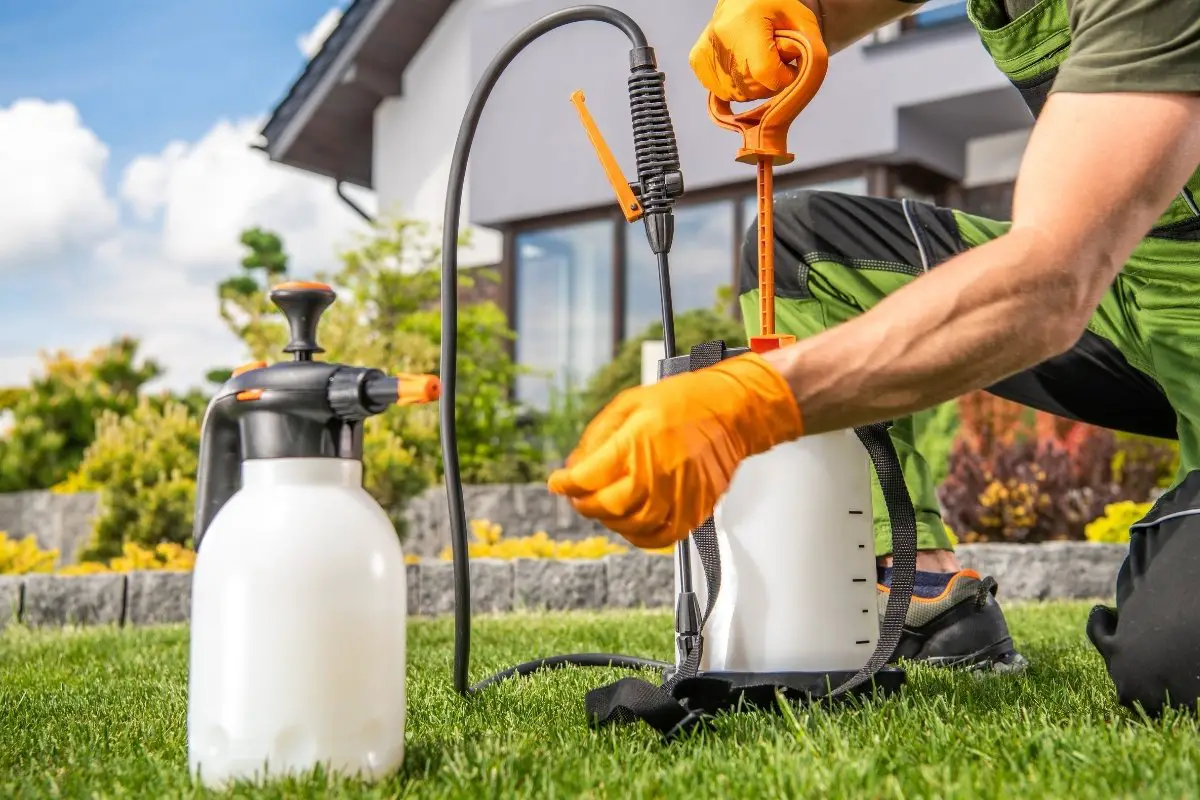Last Updated on March 27, 2022 by Fabiola L.
The big dilemma in organic gardening has to be copper fungicide vs neem oil; which pesticide is better for you and your garden? Both are classified as organic pesticides but have completely different compositions. However, both solutions are highly effective and approved for organic gardening.
You need to pay attention to your garden’s needs. What are you dealing with more often, pests or fungus? Are you concerned about pesticide residue in the soil and toxicity? Neem oil might be better for those wanting a more natural approach. But copper fungicide comes with added benefits that can help your plant yield better fruit. So can I use neem oil and copper fungicide? Let’s solve the dilemma of copper fungicide vs neem oil.
How To Choose The Best Pesticide
There are thousands of pesticides on the market. Some are granulated and used around the established plant; others are liquid and sprayed on the foliage. So, copper fungicide vs neem oil, which one does the job better? These products have one goal; to keep your plants healthy and thriving.
Organic gardening limits using some common pesticides that might leave residue in the soil and inside the fruit. But this doesn’t mean you’re stuck with handpicking spider mites from your tomatoes.
Organic pesticides are equally effective but with minimal effect on the environment. However, they’re not entirely harm-free.

Synthetic Or Organic?
Conventional gardening includes the use of synthetic pesticides that are chemically modified. Organic pesticides are derived from natural ingredients and involve little to no chemical adjustments.
The comparison of copper fungicide vs neem oil is essentially synthetic against organic solutions. It’s worth noting that the USDA approves copper fungicide for use in organic agriculture. But only under a particular method that discourages its long-term effect on the soil.
Copper Fungicide Vs Neem Oil
Copper fungicide works by killing pathogens on the plant’s surface before they’re a visible pest or develop into a major infestation. It takes one to two days to notice a difference. So it’s excellent at preventing issues and removing them at the first signs.
On the other hand, neem oil has to be ingested by the pest to work. Then it affects the growing and feeding hormone, starving off the pest and killing it. It also stops the pests from mating, eliminating any infestation.
But the difference between copper fungicide vs neem oil is not only in how they act.
What Is Copper Fungicide
Copper fungicide is a liquid solution made from copper and chemical additives that help dissolve the metal. Copper is soluble and penetrates the plant’s leaves to kill any starting fungal disease or prevent it. Is copper an effective fungicide? Well, it won’t help if the condition has been existing for a while. This is one crucial difference between copper fungicide vs neem oil.
Copper fungicide is applied on wet leaves on days when you’re sure you’ll get at least 12 hours of dry weather.
Bonide 811 Copper 4E Fungicide 16oz (473ML)
Pros Of Copper Fungicide
Excellent in Preventing Disease – Copper fungicide is the ideal solution for preventing downy and powdery mildew, fire blight, black spots, and anthracnose. It kills the fungus pathogens before they can set on the plant.
Acts as Fertilizer – There is a sustainable amount of copper in this fungicide that washes away from the leaves into the ground. It can help enrich the soil below the plant.
Boosts Fruit Growth – Limited amounts of copper can improve the fruit’s look, taste, and quality, making it tastier and juicy. You can use this fungicide up until harvest.
Click Here to Learn about:
Cons Of Cooper Fungicide
Toxic in High Amounts – A higher amount of copper fungicide can kill cells in the plant, leading to scorched leaves. Unfortunately, it’s also highly toxic to humans, pets, and insects like bees and butterflies.
Can Burn the Leaves – In some plants, especially in younger leaves, the copper fungicide can penetrate and burn them. As the solution dries on the leaves, the copper stays. It’s ‘reactivated’ each time the leaves get wet sending new ions to tackle pathogens. But they also penetrate the leaf in places where the protection layer is thinner, leading to copper burns.

Accumulates in the Soil – When comparing copper fungicide vs neem oil, the first one is at a major disadvantage regarding soil effect. Copper fungicide is not soluble. As it washes off, the leaves in goes into the soil, where it accumulates over time. Copper-rich soil averts iron consumption, reduces seed germination and plant life. Decreasing the copper levels is extremely hard.
Can Change Fruit Flavor – Copper helps the fruit retain more water, but higher amounts of copper leads to watery, tasteless fruits.
Check Out Palm Spider Mites – Get Rid Of Them In 4 Easy Steps
What Is Neem Oil
Neem oil is vegetable oil, a natural product made from an evergreen tree called Azadirachta indica. This tree is native to the tropical regions of Sri Lanka, India, and Malaysia. In the US, only the states in zone 10 might be able to grow a neem tree.
The oil is yellow with repelling solid odor. Most commercially sold neem oils need to be diluted with water before use. Spray once a week in the evening or morning. Is Neem oil good as a fungicide? Actually better than the copper fungicide.
Pros Of Neem Oil
Natural and Biodegradable – Neem oil is a natural product, often cold-pressed, and biodegradable. Comparing copper fungicide vs neem oil, the second doesn’t accumulate in the soil.
Balanced Fertilizer – Once the neem oil washes from the leaves and into the soil, it acts as a fertilizer. It contains fatty acids that can help in feeding the plant. It also works as a foliar fertilizer.
Kills Nematodes – Nematodes are larvae in the soil that feed on the plant’s roots, cause root rot and eventually kill the plant. Neem oil is effective in killing them when absorbed into the soil.
Feeds Organic Matter – The fat in the neem oil feeds microorganisms in the soil and earthworms, helping it stay heterogeneous and healthy.
Read more about Where Do Slugs Come From At Night? – An Overview
Cons Of Neem Oil
Can Cause Skin Reaction – Use gloves when handling neem oil as skin contact can cause rashes, hives, or allergic reactions. When it comes to skin irritation copper fungicide vs neem oil are almost equal.
Effective Only on Chewing Insects – Pests have to ingest the neem oil for it to work. Fungus and more minor pests are disabled once the oil covers their bodies, limiting movement and feeding. But to work on larger pests if they have to ingest it.
Can Fry Leaves – Like any other oil, neem oil has a thicker consistency, and too much of it will clog the cuticles and suffocate the leaves. Excess oil on the leaves combined with intense sunlight leads to frying. Is neem oil the same as copper fungicide when it comes to leaf damage? Unfortunately, yes.

Final Verdict: Copper Fungicide Vs Neem Oil
There’s no clear winner in the battle of copper fungicide vs neem oil. Copper fungicide is more effective as a preventative, but it also comes with more risk. Neem oil is entirely natural and biodegradable, but it might not be as effective.
Understand what your garden needs, what are your common pests or fungus are, and then decide on the ideal solution.
FAQ’s
Is Neem oil the same as copper fungicide?
No, neem oil is a vegetable oil derived from the neem tree. Copper fungicide is a chemical solution of metal and other additives.
Can I use neem oil and copper fungicide?
Neem oil usually mixes well with other pesticides or fungicides. Take a smaller jar or bottle and test if the two liquids will mix. You want a good solution that's easy to spray, not clumping.
Is Neem oil good as a fungicide?
Neem oil is an excellent fungicide. It helps protect the plant from phytopathogenic fungal diseases, blight, black spot, mildew, botrytis, gray mold, rusts, and anthracnose.
Is copper an effective fungicide?
Copper is a very effective fungicide preventative. It stops pathogens from setting on your plant and developing. But it's less effective when the disease is in full force.
Find more information about Why Neem Oil For Tomato Plants Is The Best Organic Fertilizer – Find Out With These 5 Amazing Tips
Mary is a passionate gardener who loves spending her days getting her hands dirty and nurturing her plants. She‘s an avid reader of gardening magazines and is always looking for new ways to make her garden thrive. When not outside tending to her plants, Mary can be found inside reading up on the latest gardening trends, comparing notes with fellow gardeners, and finding the perfect pottery planter for her next planting project.



